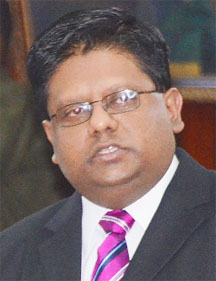Despite Minister of Natural Resources, Robert Persaud giving the impression that a controversial survey in the south east carried no implication of mining, the Minister of Finance in this year’s budget had referred to likely extraction.
Minister of Finance Dr. Ashni Singh, in his budget speech to the National Assembly earlier this year, had said that rare earth elements present a new opportunity for investment and with industrial countries actively pursuing alternative sources, Guyana offers new terrain.
“To this end, Govern-ment has invited expressions of interest for two locations, one in southern Guyana and the other in Middle Mazaruni. This is likely to give rise to the development of exploratory activity in the first instance and subsequently, conditions permitting, extraction,” he had said.

His reference to southern Guyana is most likely the one pertaining to Muri Brasil Ventures which has gotten Persaud into hot water as he had not disclosed in two separate meetings with a parliamentary committee and a human rights group that mining was likely to occur in the New River area.
The granting of survey permission to Muri Brasil Ventures to search for rare earth metals in the New River Triangle has created a furore including over what Persaud did not reveal about a Permission for Geological & Geographical Survey (PGGS) granted to the company which covers the ecologically-sensitive south east of the country.
Persaud had last month sought to assure the Natural Resources Com-mittee of Parliament and the Guyana Human Rights Association (GHRA) in separate meetings that no mining east of the New River was expected. How-ever, since these assurances were given, an agreement with the company has surfaced containing a clause which compels the Guyana Geology and Mines Commission (GGMC) to provide a maximum of 18 prospecting licences in the said New River for a variety of minerals upon application by the company.
Following declarations last week by opposition MPs that Persaud had withheld information on the deal with Muri Brasil, the Ministry of Natural Resources had sought to defend the minister by stating that he had been upfront on his disclosures and had told the same to GHRA. The human rights body has since said that if the content of a survey permission for rare earth metals is as reported in the media, then it has been misled by Persaud. The ministry in a response has said that the information requested had been provided and there was no attempt to mislead.
When he appeared before the Natural Resources Committee last month, APNU member Joseph Harmon asked Persaud whether mining leases were issued for lands in the area of the New River Triangle or in the contiguous area.
“I am advised by the Manager of the Land Management Administra-tion Section of the GGMC that no mining permit licenses or any permission be given for mining in the area you have outlined. I want to make that categorical. What I do know and I am also (to) be advised by the GGMC is that there have been applications for persons to engage and these applications are not being considered at this point in time until and unless we so have a policy direction of encouraging and allowing mining. The position of the government at this point in time is not to permit mining in that specific area as you have so highlighted,” he is quoted as saying in the transcript provided by Parlia-ment Office.
Persaud had released the transcript after concerns were raised about the accuracy of his statements during his presentation. While he alluded to there being no policy direction at the moment of encouraging and allowing mining in that area, Singh’s budget speech had signalled that mining could eventually happen there.
Up to last year, it was known that at least three companies were exploring in Guyana for rare earths—a little-known class of elements found in a wide range of gadgets and consumer goods. “Rare-earth elements” are so named because they are not found in heavily-concentrated deposits. They are used to build a wide range of computerised products, from cellphones to guided weaponry to green technologies such as windmills and hybrid cars. China is the world’s dominant rare earths producer and demand is swelling for this product.
The main companies exploring for rare earths here were Prometheus Resources, Pharsalus, and RPM Exploration and these are active and have been granted Prospecting Licences (PLs), Persaud told Stabroek News in August 2012. Pharsalus is also looking to get involved in gold mining while the parent company of RMP is involved in gold mining.
Aside from its gold and precious metals PLs, Pharsalus explores for radioactive minerals and rare earth elements in the North West District of Guyana.





